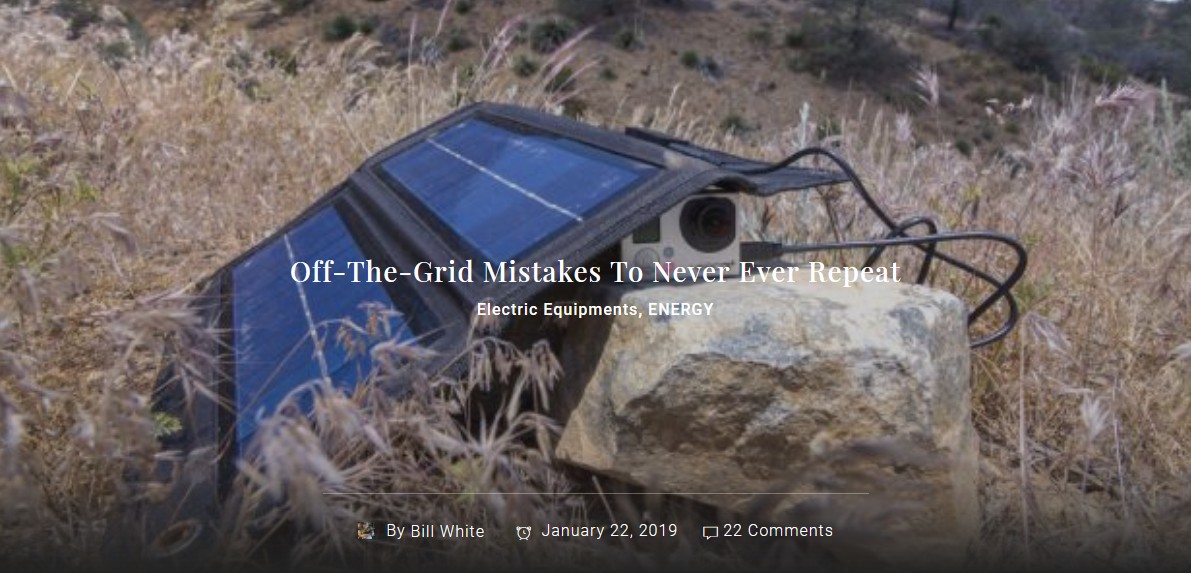Article Tips from the Field of Master Mind Survival (MMSUR)
Shared from the research of: Joseph Mercado
Article Author: Bill White
Content Contributor: Survivopedia
To: Survivalist
Blog Post #970 📌
Re: Off-the-Grid
Date and Time: Thursday, June 18, 2020 at 11:35 a.m.
Dear Survivalist,
Like many, I aspire to move totally off-grid.
I’m just not comfortable with the condition the world is in today and the dependency we all have on the grid.
On top of that instability, I want the freedom that being off-grid offers me, especially financial freedom.
Living off-grid would reduce my monthly cost of living, something I need to consider before reaching retirement age.
But more than anything, I just want to prove that I can do it.
I’ve been working towards this aim for a number of years and I’ve made a lot of mistakes along the way.
Most of those were due to simple lack of understanding on my part; the same reason why many others have made mistakes.
But now that I’m moving, forcing myself to start over again (as crazy as that may seem), I need to make sure I don’t make the same mistakes.
Actually, I’ve since learned that many of these mistakes are common.
In a way, that makes me feel better, as I’m not the only one. But at the same time, I sure wish someone else had warned me about these mistakes, saving me the trouble.
There’s more than one way of talking about going off-grid.
Most commonly, this refers to off-grid power, producing your own electricity.
But off-grid living can include much more than that; at its fullest extent, off-grid living means full self-sufficiency and sustainability.
You’ll have to decide for yourself how much you want to do to reach that goal.
Multiple Power Sources:
When we talk off-grid power, that usually means solar and wind power.
While there are some other means of generating electricity, like hydroelectric, most of us are limited to those two options.
In some parts of the country, we might be limited to only one of them, either due to lack of wind or lack of sun.
Ideally, an off-grid power system will include both wind and solar power. That way, you’ll still have some electrical power consumption, even if one isn’t producing anything.
Where I live, the wind tends to be stronger at night, which is great, as my solar panels don’t produce any power during those hours.
The only reason I’m not using hydro-power too, is that I don’t have a river available.
Do it Yourself and Save Money:
Let’s face it, solar and wind power are expensive.
When I got a bid from a contractor to put solar power on my house, it was over $60,000. A good wind turbine can run $10,000 or more.
These aren’t cheap technologies. However, you can save yourself a bundle, if you make it yourself.
You can make your own solar panels for roughly half of what you can buy them for, and it’s really not all that hard to do. However, the work is very tedious and you have to be careful, because solar cells break very easily.
Likewise, you can make a pretty decent wind turbine for a very reasonable price; for that matter, you can make several of them, for what you’d pay to buy one commercially manufactured one.
The other advantage of doing it yourself is that you’ll understand the system. That way, when you need to make repairs, which will happen eventually, you’ll know how to do them.
Should there ever be a breakdown of the power grid and you need to live off the power you produce, that knowledge will be invaluable.
Reduce Your Power Consumption:
Off-grid power is expensive; there’s no two ways about it. Even doing it yourself, you’re going to spend a lot of money. So there’s no reason to make things harder for yourself.
Put another way, there’s no reason to make it necessary to produce any more power than you have to. Each watt of power you can save, reduces how much you have to spend money so that you can generate.
There are lots of things you can do to reduce your power consumption, especially today, where there are so many energy-efficient alternatives.
Start by switching all your lights over to LED, then see what else you can do.
Another way of saving electrical power is to switch over to 12 volt devices, rather than using 120 volt ones. The power your off-grid system is going to produce is 12 volts DC.
If you have a refrigerator which will run off of that, rather than normal 120 volt AC house current, that’s less power you have to run through an inverter, with the corresponding loss due to the inefficiency of the inverter.
Of course, you want to also make sure that you aren’t just wasting power, doing things like running lights when you don’t need them or leaving your television on when nobody is watching it. Remember, every watt counts.
Don’t Underestimate:
Solar power companies aren’t really your friend, when it comes to figuring out how much power you need to produce.
They are hoping to sell you a system which will produce the average power you use, with the idea that you will sell power to the electric company when you are producing too much and buy it from them when you need more.
But if you’re going off-grid, doesn’t that indicate that you won’t be buying and selling power?
You actually need to be able to produce power at your peak usage level, not something less.
Yes, you’ll be storing some power in your battery backup system, but that won’t be more than a day’s worth.
One thing you have to watch out for here is the conversions from 12 volt DC to 120 volt AC.
When you change the voltage, you inversely change the Amperage/Current.
So, if you need 1000 watts of 120 volt AC power, you have to pull 1000 watts of 12 volt DC power from your battery bank this would be approximately 100 Amps.
Actually, it will be a little more than that, because the inverter doesn’t work at 100% efficiency.
Get Your Angles Right:
A solar power contractor will mount your solar panels flat on your roof, whatever your roof angle is. That’s a big mistake.
To get the most out of your solar panels, you need to set the angle they are mounted at to match the sun’s track in the sky. This is calculated based upon the latitude you live at.
To make things a bit more complicated, the sun’s track changes throughout the year. That’s why we have four seasons.
So, if you want to get the maximum efficiency, you need to be able to change the angle your panels are by about 20 degrees every season. That mean mounting them in a way that making those changes is relatively easy.
Please note that if you are not the person who is going to make those changes every quarter, then set the solar panels at the right angle for spring and fall. That will give you the best efficiency on an year-round basis, while saving you that extra work.
More Battery Backup:
Just about everyone I’ve ever seen blows it on the battery backup. Ideally, you need enough battery capacity to account for two full days of your peak electrical usage. If you can’t do that, then you want at least a day’s worth.
That’s a lot of batteries, when you stop to figure it out, especially when you have to boost the 12 volt battery power to 120 volts for your home’s appliances.
Spare Parts:
It’s well worth the investment to have a few critical spare parts around. Specifically, you need to have bearings, brushes and electrical contacts for your wind turbine. You also need a spare solar charge controller and voltage inverter for your solar power system.
The panels aren’t likely to go bad, even in an EMP; but the charge controller can.
A Huge Water Cistern:
Regardless of how you are getting your water, whether through a well or rainwater capture, you want to have a huge storage capacity, at least a couple thousands of gallons.
That way, you’ve got water, even if your off-grid power fails or you hit a dry spell. If you’re pumping water out of a well, then set your pump on a timer, so that it fills your cistern during times when you’re drawing less electricity or producing more electricity than you need.
One of the easiest and cheapest ways of coming up with a cistern is to buy an above-ground swimming pool. If you put a cover over it, that will be enough to keep leaves and dirt out. Treating the water, as if it were being used as a swimming pool will keep it safe to drink.
That Garden’s Not Big Enough
I don’t care how big your vegetable garden is; chances are, it’s not big enough. I’m sure you’ve seen articles about people who raise all their own food, sometime.
Those people covert their entire backyard into a vegetable garden; they don’t just have a small one. I had a neighbor like that once and he not only used his whole backyard, but half of mine as well.
It takes about a ton of food per year to feed one adult. So you’re going to need to up your ante on your gardening, if you’re planning on going off-grid with your food.
The hardest part is growing grains, which also happen to take the most space.
Of course, if you’re going to raise any sorts of animals, you’ll want to raise their feed for them too. Otherwise, how will you feed them, if there’s a breakdown in society?
Don’t do it All Today:
One thing that will drive you nuts, if you let it, is the pressure to try and do everything at once.
Of course, this is the same problem that any prepper has. Once you start along the road towards going off-grid, you’re going to feel like you’re going too slow and want to do it all.
The reality is that you can’t do everything at once. It requires too much time and too much money. Besides, you’re going to have to learn how to do many of the things you want to do and that’s going to take time as well.
So, spread it out. Work on learning one thing at a time, so that you don’t overload yourself. Once you become proficient with that new thing, then you can add something else.
Going off-grid isn’t so much a destination, as a journey.
There will always be something else that you’ll think of adding to your off-grid lifestyle, whether it is smoking your own meat or keeping bees.
Relax and enjoy the journey:
Finally, don’t be in a hurry to pull the plug and cut yourself off from society.
Rather than that, look at the infrastructure you’re trying to break away from as your safety net.
There is no requirement to disconnect the power meter from your house, nor is there a requirement to use any minimum amount of electricity in any given month.
Keep it hooked up and just don’t use it. That way, if something goes wrong with your system, you’ve got something to fall back on.
This is true of all your systems, not just the electric grid. When I put in a well, I kept my hookup to the city’s water system. While I didn’t use it, I had that capability, if something went wrong with my well.
Likewise, when the city put in sewer lines, I kept my septic system intact, with a diverter so that I could use them, if the city system ever went down.
They didn’t want to let me do that, so I did it after they had finished their work; the city doesn’t know about it. Oh well, what they don’t know, won’t hurt them.
There’s another good reason to keep yourself connected; that’s because more and more municipalities are passing laws against going off-grid.
That sounds like crony capitalism to me, with the utilities paying the politicians to make sure they have a customer base.
But regardless of the reason, they can’t complain that I’m not using enough water and electricity, as long as I’m still hooked up to their system.
About the Author:
Bill White is the author of Conquering the Coming Collapse, and a former Army officer, manufacturing engineer and business manager.
More recently, he left the business world to work as a cross-cultural missionary on the Mexico border.
Bill has been a survivalist since the 1970s, when the nation was in the latter days of the Cold War.
He had determined to head into the Colorado Rockies, should Washington ever decide to push the button.
While those days have passed, the knowledge Bill gained during that time hasn’t.
He now works to educate others on the risks that exist in our society and how to prepare to meet them. You can send Bill a message at editor [at] survivopedia.com.
Content Source: Survivopedia.com

 Email Us a Message
Email Us a Message 

Please send us a personal message below and we will serve you momentarily.
We appreciate you visiting the MMU Global Research Directory
For more blog posts, videos, articles, and to generate more knowledge, please feel free and…
 Fly Over to the MMU Facebook Page with Hoot
Fly Over to the MMU Facebook Page with Hoot 
 Visit the MMA Facebook Group Today
Visit the MMA Facebook Group Today 
 Claim Your Own 32GB Survival I-CHIP Think Drive Here for Only $67
Claim Your Own 32GB Survival I-CHIP Think Drive Here for Only $67
 Get 42 Nuggets of Survival Knowledge: (12) MP4’s
Get 42 Nuggets of Survival Knowledge: (12) MP4’s  + (12) MP3’s
+ (12) MP3’s  + (8) PDF’s
+ (8) PDF’s  + (5) HTM’s
+ (5) HTM’s  + (5) TXT Files
+ (5) TXT Files 







